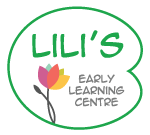At Lili’s Early Learning we believe that Planning and Evaluating should be unique and reflect the values, knowledge and skills of children, families and staff. The programs need to provide a safe, nurturing environment that meets the needs of children and promotes the physical, social, emotional, language, and cognitive development of children.
We understand the needs of children at different ages. Children from 0 to 6 years are rapidly growing and learning. We believe the program needs to be:
- Based on the developmental needs, interests and experiences of each of the children
- Take on a holistic approach to learning and development
- Sensitive to individual differences of each child
- Related with every aspect of each child’s development
- Reflect the multicultural nature of our Australian society
- Be challenging, interesting, and varied, providing lots of choices
- Be evaluated regularly and is reflective, inclusive and provides direction for future action
- Have parents’ involvement with the planning, implementation and evaluation.
- Each room leader and assistant are responsible for the organization and curriculum of their room under the guidance of the centre manager. Room leaders are allocated child free programming time each week to plan for and evaluate each child’s ongoing development. This time is essential for the delivery of a high quality curriculum throughout the Centre.
THE PROGRAM
- Each room has overall aims, objectives and a philosophy that guides the program, and incorporates objectives for individual children. Weekly child free programming time is allocated to room leaders to plan for individual child’s needs and monitor their progress.
- We base the children’s programs on observations taken of the individual children and from parental input.
- The program is designed to cater for each child’s needs and interests and is built around play. Play is a vital part of a child’s life and is the way they make sense of their world. It is the basic ingredient to learning, develops new skills, and stimulates intellectual growth. We value play very highly in our daily experiences with the children and this is the base for most activities.
- We observe children’s interests, abilities and needs carefully and provide appropriate individual and group experiences to challenge and stimulate each child.
- The program is flexible, allowing for spontaneous as well as planned experiences; the day is organized to allow children time to become meaningfully involved in learning experiences and transition times and routines are unhurried and enjoyable.
- The physical environment, both indoors and outdoors provides children with choices, challenges and encourages exploration and learning in a safe and supportive environment.
- The outdoor space is an extension of indoors and is considered another space for learning. The outdoor program addresses the child as a whole. There are many opportunities for children to learn about themselves, each other, and their environment. There are a range of experiences within the outdoor environment that promote investigation, encourage exploration and movement, and enrich interactions. There are diverse materials that inspire children to be creative and express themselves in original ways.
- Positive behavior guidance and good role modeling is an integral part of the educational or educational program provided. Interactions between staff and children are encouraging and constructive.
- Opportunities for individual and small group experiences as well as a few whole-group experiences are provided.
- Parents are viewed as valued partners with staff in the program. Parents are encouraged to make suggestions, voice concerns, and share in decision making about their child’s experience.
The program plans are displayed within the centre for staff and parents for their perusal.
Sourced: Education and Care Services National Regulation Children’s Services Guidelines deewr.gov.au/Early Childhood Policy reviewed August 2017

